Who are the key characters?
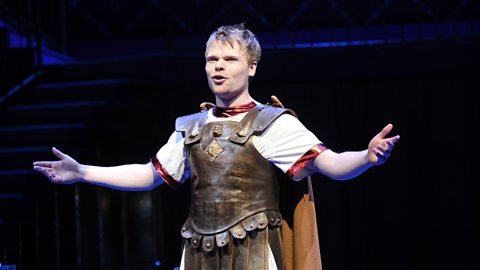
The characters in The Merchant of Venice are divided into Christian and Jewish characters. There is a focus on the antisemitismAntisemitism is a type of prejudice or discrimination towards Jews individually or as a group. It is based on unfounded stereotypes that target Jews as a people or their religious practices and beliefs. attitudes and behaviours of some of the Christian characters.
The main characters in The Merchant of Venice are: Shylock, Antonio, Bassanio and Portia.
The secondary characters are: Nerissa, Gratiano, Jessica, Salerio and Solanio.


МэМэМэМэМэМэ
Remember
When writing about character in the exam, it is important to back your views up with evidence from the text.
The way in which a character speaks and behaves will provide clues.
Shylock
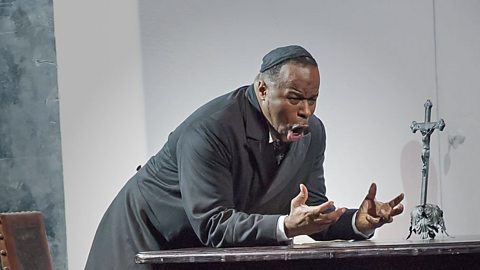
- Merciless
- Money-obsessed
- Victim
Shylock is a Jewish moneylender living in Venice.
He lends money to Antonio on the condition that he can cut off a piece of Antonio’s flesh if he fails to pay him back on time. Shylock is determined to have the piece of flesh, and even puts Antonio on trial to get what he is entitled to.
By the end of the play, Shylock is ordered to give away half his fortune and convert to Christianity.

Context: Antisemitism

The Merchant of Venice is considered controversial because of its portrayal of antisemitism.
Antisemitism is a type of prejudice or discrimination towards Jews individually or as a group. It is based on unfounded stereotypes that target Jews as a people or their religious practices and beliefs.
The impact of antisemitism has resulted in Jewish people facing discrimination, being banished or even murdered.
Antisemitism was common in in Europe when Shakespeare wrote The Merchant of Venice. In Venice itself, Jewish people had been forced to live in a separate area of the city since 1516.
Today there are various interpretations of antisemitism in The Merchant of Venice. People cannot agree on whether the play is antisemitic or seeks to criticise antisemitic behaviour. This is one of the reasons it is sometimes described as a “problem play”.
Question
How could you argue that Shylock deserves our sympathy, despite his cruel and merciless behaviour towards Antonio?
- Shylock has been kicked, spat at and treated as if he was not even a human.
- Many of the characters in the play call him “Jew” rather than use his name.
- His daughter runs away and he is mocked for it.
Whilst it is difficult to excuse his cruelty, an audience will empathise with his pain and feel sympathy for him because of the antisemitic prejudice he encounters.
Antonio

- melancholicBeing full of sad and sorrowful thoughts.
- Generous
- antisemitismAntisemitism is a type of prejudice or discrimination towards Jews individually or as a group. It is based on unfounded stereotypes that target Jews as a people or their religious practices and beliefs.
Antonio is the title character of the play – a wealthy and successful merchant.
He makes a bloodthirstyCruel and barbaric. deal with Shylock, allowing Shylock to cut off a pound of Antonio’s flesh if he is unable to repay money borrowed. He is put on trial for failure to pay Shylock’s debt, but is dramatically saved at the last moment.
He is a complex character, whose kindness towards his Christian friends is in sharp contrast to his antisemitic hatred of Shylock.
Although Antonio is the title character of the play, he is not an active participant in the events of the story. He is passive - much depends on the outcome of the bargain he makes with Shylock, but the main parts of the plot centre around the romance between Bassanio and Portia, and the tragic downfall of Shylock.


Did you know?
Some directors have tried to explain Antonio’s sadness by examining his relationship with Bassanio, suggesting that Antonio has feelings of romantic love for Bassanio.
In Act 3, Scene 3 he is arrested and told that Shylock may get his pound of flesh. Antonio’s response is unusual – he claims not to care if he dies, as long as he gets to see Bassanio again.
Pray God, Bassanio come/To see me pay his debt, and then I care not!"
Bassanio

- Intelligent
- Selfish
- Loyal
Bassanio is the romantic lead of The Merchant of Venice. He borrows money to visit Portia in Belmont.
He solves the riddle of the caskets and rushes to help Antonio when he learns that he is on trial.
Bassanio is another complex character in the play. His good qualities of loyalty and intelligence are balanced with his selfishness and lack of responsibility.
However, by the end of the play Bassanio has expressed deep regret for the trouble he has caused Antonio, and appears to be a loving and kind husband to Portia. This shows he is capable of change and has grown as a character.

Mini quiz
Portia
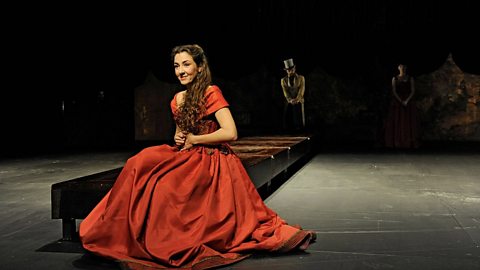
- Intelligent
- Merciful
- Witty
Portia is an heiressA woman legally entitled to the property or estate of another upon their death. who lives in Belmont. She is restricted by patriarchyA social system in which men rule and hold power over women. and cannot speak freely or choose a husband of her own.
She loves Bassanio and eventually marries him. She disguises herself as a male lawyer to save Antonio at his trial.

Context: The role of women in Shakespeare's time

Women were expected to be wives, mothers and homemakers and had very little power or influence.
Women were not allowed to act on stage and companies of actors would use either young men whose voices had not broken for younger parts, such as Jessica in The Merchant of Venice, and older men for mature female roles.
Portia is a confident woman – with strong views about others and on her own situation, but she never speaks these views publicly. She can only speak in private to her waiting woman Nerissa. Arguably the only time that Portia has any real power in the play is when she disguises herself as a man.
Secondary characters
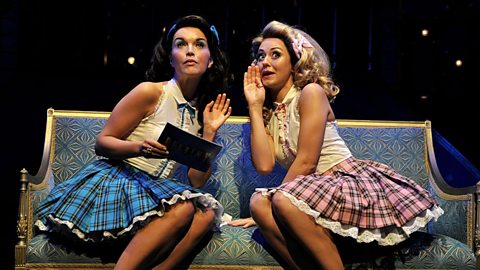
Nerissa
Nerissa is Portia’s waiting woman. Portia confides in Nerissa about her feelings and mocks unacceptable suitors with her. Nerissa disguises herself as the lawyer’s clerk in the courtroom scene to help Portia.
Gratiano
A friend to Antonio and Bassanio. He becomes romantically involved with Nerissa. He is an energetic and witty character with a rude sense of humour and contributes to some of the comedic elements of the play.
Jessica
Jessica is the daughter of Shylock, who disowns him and runs away with Lorenzo, a young Christian man. Jessica’s conversion to Christianity is humiliating to Shylock. Shylock is also worried about the money that Jessica steals from him when she runs away.
Salerio and Solanio
Two of Antonio’s friends who often discuss events that have happened off stage - such as the loss of Antonio’s ships or Shylock’s reaction to the disappearance of Jessica. Shylock delivers his speech about the mistreatment of Jewish people to Salerio and Solanio.


Did you know?
Staging during Shakespeare's time - audiences would talk about going to “hear a play” rather than “watch a play”.
Staging and costume were usually quite simple. Salerio and Solanio’s explanations and descriptions of off-stage action would therefore not be unusual.
Mini quiz
Quiz
Test your knowledge of the characters in Shakespeare’s Merchant of Venice by taking this multiple-choice quiz.
More on The Merchant of Venice
Find out more by working through a topic
- count3 of 5
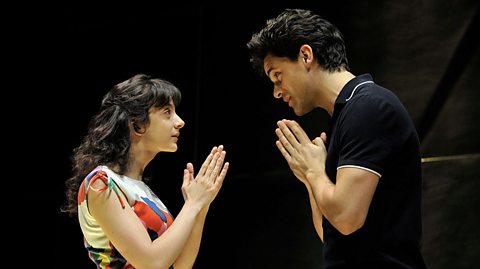
- count1 of 5
